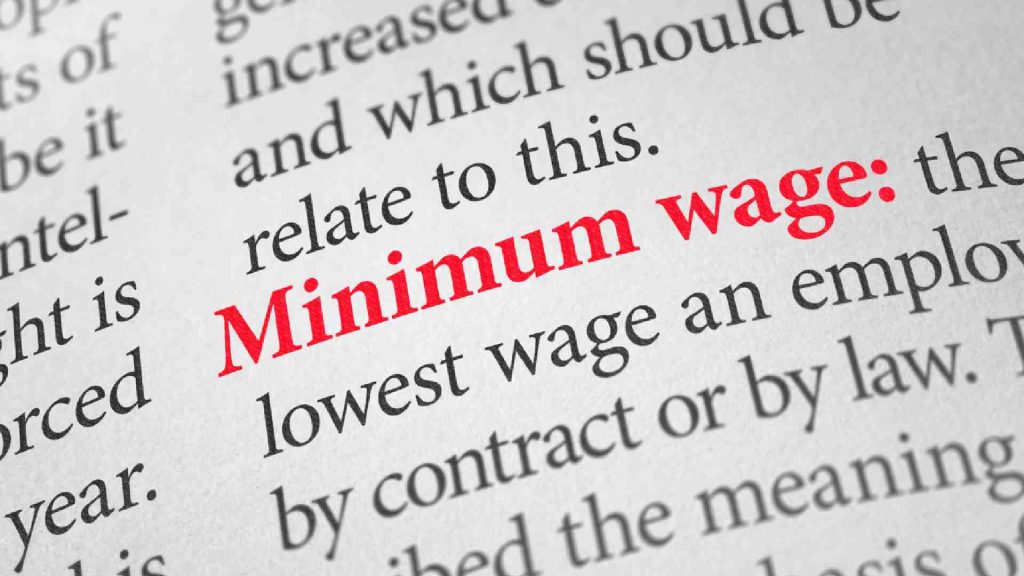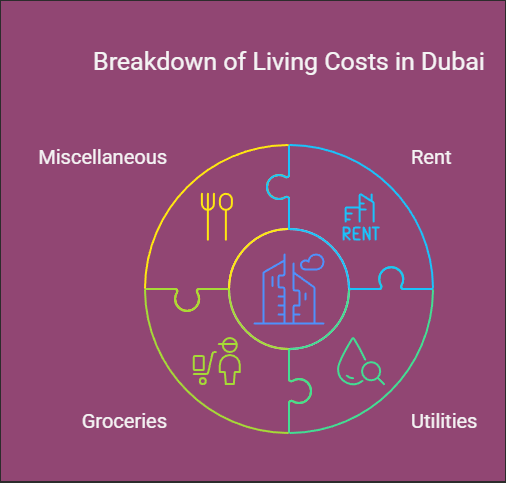One of the most popular places for professionals seeking for work is the United Arab Emirates. The UAE minimum wage is one of the most often asked questions among job searchers, nevertheless. In a similar vein, overseas employers who want to adhere to the legislation also want to know how manage the minimum wage in UAE.
In this article, we will be talking about the minimum wage UAE. Additionally, we will give you unparalleled insight about the living cost of the minimum wage Dubai. Let us see:
1. Learn all about the minimum wage in UAE

Workers want to be compensated fairly for their experience and education when it comes to employment. While some job responsibilities may pay more than others, professions that do not demand a lot of skill might pay less.
Regardless, every worker must obtain their payments on time and in accordance with their qualifications. A minimum salary or wage is the lowest legal sum that an employee must receive for their labor and it differs in every nation. This implies that an employer is not in compliance with the law if it pays an employee less than the minimum wage.
It is crucial to note that there is no minimum salary in UAE. Additionally, it is important to keep in mind that the UAE basic salary and the minimum wage are not the same.

1.1 Learn about the basic salary
The amount that the worker is paid, as stated in the contract, is the basic salary in the UAE. The basic wage is paid before any benefits, expenditures, or other compensation. As a result, it is the compensation the employer gives the employee for upholding their contractual duties.
The base income must be in the employment contract, according to the new UAE Labour Law. Moreover, this salary is also called as basic compensation since it excludes other in-kind benefits and allowances.
Workers in the UAE, on the other hand, receive allowances as an extra to their income. Phone, housing, communication, transportation allowance, and other benefits are among them.
Thus, the gross salaries are the basic income plus the allowances. In addition, allowances should be specific in the contract. Finally, there is the net salary, which is the total compensation less any deductions.
To summarize, there is no minimum wage in Dubai, although there are three sorts of wages:
- Basic salary: the contract’s stated basic remuneration.
- Gross salary: basic wage + allowances.
- Net salary: gross salary without deductions.
1.2 Is there a mandatory minimum salary in UAE?
One of the most frequently asked questions by people looking for work in the UAE is this one. Likewise, in order to comply with the law, overseas companies also want to be aware if there is a minimum salary in UAE. Nevertheless, the answer is no, there are no minimum wages in UAE. This indicates that there is no set minimum wage that a firm need to pay employees.
Since there is no minimum wage in the UAE, pay rates must be negotiated between businesses and employees. The UAE Labour Law makes no mention of a minimum wage, despite the widespread misconception that there is one in Dubai. Additionally, there is no mention of a UAE basic pay percentage in the statute.
Although it can initially appear to be a drawback, the UAE takes seriously the working conditions of its citizens. As a result, the legislation mandates that the employee’s compensation be high enough to meet their fundamental necessities. Consequently, if the employer or employee feel that the payment is not enough, they can always amend the employment contract.
The Cabinet may at any moment issue a resolution regarding the minimum pay for workers in any category; as the Article 27 of the UAE Labour Law states. This shows that there is a chance the UAE will enact minimum wage laws in the future. It is not, however, still a fact.
2. Know the average wages of different job positions in the region
Although the UAE does not have a minimum pay, there is an average compensation that varies depending on the work type that the individual would be taking. An example salary range for a domestic worker would be AED 1,100 – 1,800. This is advantageous since the employee may now have a sense of how much money they will make. Furthermore, it aids in their negotiations to reach a better settlement.
Due to this, even if there may not be a minimum income for a given occupation in Dubai, an individual may nonetheless choose, based on his or her categorization, to refuse to accept anything below the following amount:
- Graduates from universities should not make less than AED 12,000 per month.
- No skilled worker should make less than 5,000 AED per month.
- Technicians with skill levels should not make less than 7,000 AED per month.
Knowing this gives you a better picture of what you can provide for your staff. Additionally, it aids in negotiations so you can provide excellent salary that satisfies their fundamental wants.
2.1 Average wages in the region according to the profession
Professionals from all over the world are welcome in the UAE. The employment landscape is quite diversified, ranging from domestic assistants to top-notch executives. The average salary so varies substantially. Here are some examples:
- Baby sitters: AED 1,100.
- Nurse: AED 6,000.
- General manager: AED 35,000.
- Waiters: AED 1,200.
- Sales executive: AED 8,000.
- Software engineer: AED 11,000.
- HR manager: AED 18,000.
- Secretary: AED 4,000.
As you can see, managers typically make more money than workers with no training. The workers who make the least money in Dubai are undoubtedly those who work in the home.
2.2 Average salaries in the UAE according to the location
It is crucial to decide which area in the UAE is suitable for a person whether they are thinking about moving there for a job or to live.
The average wage is typically greater in Dubai than in the other six Emirates due to the city’s robust economy. Therefore, moving to Dubai will increase your income by 10% if you are currently working in Fujairah.
Here are the typical salaries in the UAE per location:
- Dubai: AED 21,500.
- Abu Dhabi: AED 21,000.
- Ajman: AED 19,300.
- Fujairah: AED 18,100.
3. Do you know the UAE rules for processing payroll?

For an overseas company owner, learning about how to provide appropriate contracts, salary, and perks might be difficult. And even if you still comprehend every facet of it, processing your payroll, which is a laborious process, remains to be done.
You must abide by a number of rules regarding labor compensation in Dubai. Here is a thorough list:
- Paying salaries when due: Since late payments will result in a fee and would be bad for your business, you must pay your employers on time.
- System WPS: Employers should use the Wages Protection System to pay their workers in order to avoid penalties and fines.
It is important to remember that both parties can modify the labor contract and establish a fair salary if they both agree.

3.1 What is the system WPS?
Employers pay their employees electronically using the Wages Protection System (WPS). It is an obligation to pay employees through the WPS.
The WPS enables the business to pay its employees through banks or other financial institutions. Consequently, the system’s goals are to safeguard employees’ rights and guarantee their compensation.
Employers need to be familiar with this system if they intend to manage payroll. The WPS’s benefit is that it guarantees both employee and employer happiness. As a result, it raises worker satisfaction and lowers the probability of mistakes. In order to use the WPS, you must first deliver a Salary Information File to a WPS agent.
3.2 What if the employer does not pay on time?
Your contributions will be regarded as unpaid or delayed if you, the employer, fail to make your payments on time. The employee should therefore obtain payments in accordance with the contractually agreed-upon frequency, as the law requires. It may occur weekly, biweekly, monthly, or at any other interval.
If this happens, the employee might complain, which would be bad for your business. Consider payroll outsourcing if you have been having problems with payments and the WPS because it can be the ideal solution to your problems.
4. See more about the living cost in the UAE
The UAE is regarded as an opulent place where individuals must make a lot of money in order to survive. Therefore, you must know the minimum salary in Dubai and determine whether it is practical for you or not.
To decide if it is worthwhile to give it a shot or not, it is always useful to understand what it costs to live in Dubai. Remember that Dubai is one of the world’s most opulent cities, thus the costs could be high:
- Rent: If you are moving to Dubai by yourself, you will also need to pay for housing. The typical rent in Dubai is AED 2,500–6,000, though it occasionally goes higher depending on the area you choose.
- Utilities: It is crucial to include utilities in your rental budget in Dubai. AED 500–750 is spent on electricity bills, compared to AED 200–250 for a mobile data package. Using the internet can cost between 400 and 600 AED.
- Groceries: In Dubai, groceries are not too pricey. A month’s worth of groceries for one person may cost AED 1,000.
- Miscellaneous: AED 50–75 can be spent on a restaurant dinner while AED 200–250 is spent on gym membership.
If you want to learn more about certain UAE matters, you can go to our blog section. There, you will find information about how to renew the family visa, what is the process to obtain a work permit in the region, the DMCC visa process, and more.
Additionally, if you are looking for PRO Services in the UAE, we are your best alternative. With our professional support, you can easily navigate through certain governmental processes in the UAE. Give us a call at +971 43 316 688 or email us at [email protected]. KPM PRO Services is the partner you need to succeed in the UAE!
FAQs:
Is there a minimum wage in the UAE or Dubai?
The UAE currently has no universal minimum wage, though certain professions and visa categories follow salary thresholds.
Does Dubai have its own minimum wage policy?
No, Dubai follows the federal UAE Labour Law, which does not mandate a city-specific minimum wage.
Are there minimum salary guidelines for different professions in the UAE?
Yes, salary expectations vary by profession and qualification, especially for skilled categories like engineers or accountants.
Does the UAE Labour Law mention minimum wage provisions?
While it doesn’t set fixed wage rates, the law mandates fair compensation aligned with the job role and contract terms.
Can companies in Dubai pay below market rates?
Technically yes, but doing so risks labour disputes and damages reputation. Salaries must reflect industry standards.
How can employees verify their salaries are fair in the UAE?
Employees can compare pay scales through job portals or salary reports and verify their contract terms via MOHRE.
What happens if an employer does not pay the agreed salary?
Employees can file a complaint through MOHRE, which investigates and enforces timely salary payments under the Wage Protection System (WPS).





